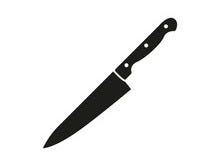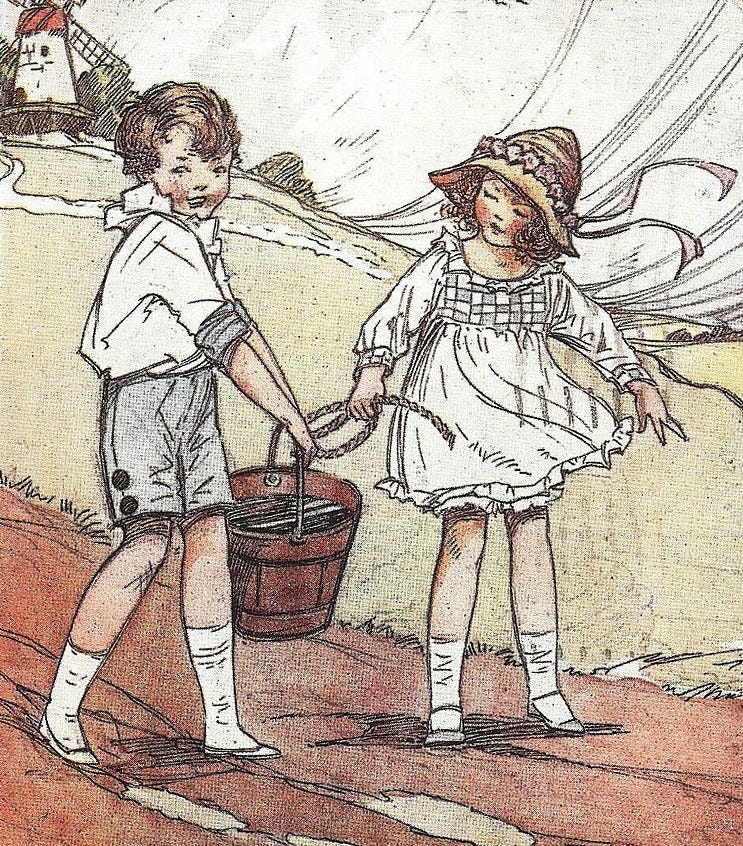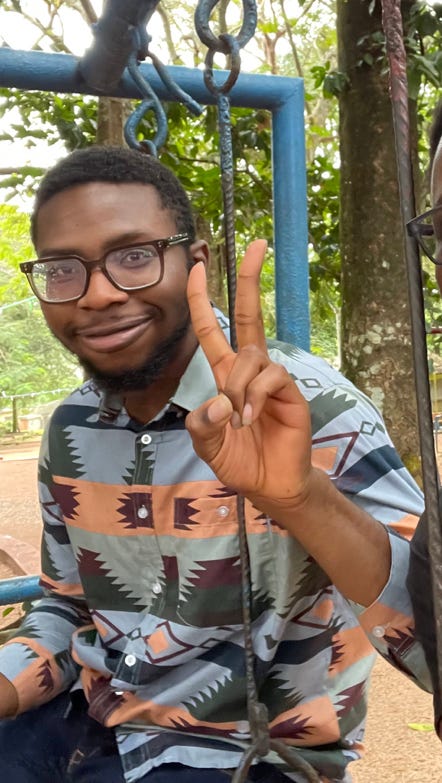The revised version
Issue five: short fiction by Osahon Ize-Iyamu
This story contains vivid images of bodily mutilation, interpersonal violence, and hints of cannibalism. Please consider your own needs in deciding whether to read this story, or another of our rich and varied stories published by The Orange and Bee.
Jack and Jill went up a hill to fetch a pail of water. Jack fell down and broke his crown, his body not immortal. And then he swelled, And then he smelled, And was taken for slaughter. And then they used his insides to make their own bread and butter.
You already know the traditional story. You know it the way you know the last page of your favourite book before you go to sleep. Tucked under your covers each evening, that nursery rhyme. That fairy tale. Jack didn’t die.
Not before I came with my knife.
Jack is waiting for me atop the hill as usual. He knows how this goes. I come—he begs—the flow of the nursery dreamworld is disturbed. He says, ‘please, girl, don’t kill me! I’ll do whatever you want! I’ll give you everything just please’.
I’m inclined to believe him. He’s a good pikin, Jack; eats before bedtime and doesn’t stress his siblings. I’m not killing him because he’s good or bad—that’s not my job. I kill Jack because sometimes we do things that are unkind to please the ones we love. To keep our homes satisfied.
‘Please, no. Please!’
I slash the knife across his face.
Our family restaurant is doing well this year.
We’ve got a pattern: Daddy makes jollof rice and chicken because that’s his role as the head of the kitchen. Mrs. Adedayo, second-in-command, cooks fried rice and barbecued fish that takes hours to clean. She orders everyone in the kitchen to work, just a step behind my father. And my job is to bring the fairy tales right into the restaurant: our secret recipe.
‘You got him?’ My father whispers as I come out of the dreamworld. There is blood on my shirt. I try to brush it off casually. I have learned to stop shaking, time after time.
‘Yes now,’ I say, carrying the sack into our inner kitchen where my father and Mrs. Adedayo cook. I set my catch on the table, show it to my dad. Jack’s body is quickly decaying, the dreamworld reality wearing off. My father’s eyes marvel at the sight. He taps my back and tells me to get cooking.
‘I’ll be upstairs waiting to taste when you’re done,’ he tells me. I nod, as he whistles out the door.
We’ve gone through several nursery rhymes over the years. The itsy spider never crawled up the waterspout. He tried, but I came and crunched his legs to bits. Later that evening, I helped my father fold him into puff puff, and everybody who came to eat him loved it. Same with Mary’s little lamb and our efo-riro specials in ’23. Nobody could understand why they couldn’t stop eating. They didn’t know, of course, that the reason the people love the food is nostalgia. Bite into your favourite tale, the one your mama used to sing, and God O, wouldn’t that food taste good.
But Jack—I know Jack is my father’s test for me. This is the first nursery rhyme he’s asked me to cook by myself, and I keep failing. We keep coming back to him each time: his story—his dreamworld—he keeps going rotten.
My father isn’t the kind of man to let a nursery rhyme go, not when it takes so much effort to get into the dreamworld. He does so much cooking for the family, and he has to trade a part of his innocence to open the gates, so I can’t disappoint him. I must make sure that his sacrifice is not in vain.
I lie Jack’s dissolving body on top of the chopping board and get to work.
Once, I entered the dreamworld and caught Jack playing on the hill. He was an overactive pikin, running up and down, fetching water and laughing with his sister. A nice boy.
I remember thinking, he is sweet. I never had that kind of sweetness. I didn’t want to kill him then.
But you already know how this story goes.
I waited till his sister disappeared before I approached him with my knife.
I lift Jack’s hands and start cutting them quickly. The smell is repulsive—rotting flies in a container of honey—but I must act fast before Jack’s body decays, and he returns to the dreamworld. I put the pan on the fire. I plan to cook him like a chicken and serve him to my father. If all goes well, I may be promoted to junior chef. If all goes well, my father will praise me and tell me he loves me.
I slice onions and start sautéing them in the pan. By the time I put one of Jack’s arms face down in the pan, the entire kitchen smells like burning meat, something putrid, and the smell fills my tongue and my throat. I gag and almost choke, but I continue. I can’t stop cooking. I’m about to put another of his parts in the pan when Jack’s mouth moves. It twitches on his face, spasms on the cutting board in a way that feels like more than an after-death reaction. It doesn’t feel as if he’s dying.
Jack is perfectly alive.
‘Please,’ he croaks. He begs. ‘Please.’
My hands shake, but I must calm down. I have to do this. I have to—
‘If anything, think of your innocence,’ he cries.
I halt in my tracks.
Once, I entered the dreamworld and caught Jack playing on the swings. He was not running up the hill that time, as he usually did, but he was laughing, going high, higher, moving so freely, in a way I had never seen before.
In a way I never could.
I was the only daughter; I was the provider. I was the one who had to fetch the stories, who had to labour, toil. We were so different, Jack and me. He had so few responsibilities whereas I had so many.
That was one of the first times I entered the dreamworld, so he didn’t remember my appearance. I was too terrified to kill someone who felt real then; the knife always shook in my hand.
Jack saw me from his swing and smiled, deep like an ocean. When he came to talk to me, he was excited.
‘I’ve never seen you before. Welcome to fairyland!’
I shook, barely able to speak. ‘I— I’m here to kill you, Jack.’
Jack’s smile quickly faded. He had never seen such darkness, and it looked as if he didn’t understand, so he stumbled. ‘But why? Please, you don’t have to do this. You’re like me.’
I raised my knife. ‘I’m not a child.’
‘But you look like me. Aren’t you? Please? We can play.’
I shook and shook, pondering whether I could remain here for life. If I could avoid my responsibilities, if I could feel lighter. Jack took my hand in his, as though calling me to a different world, but I rebuffed him. It was all an if.
‘That’s the problem,’ I said. ‘I’m nothing like you.’
That was the first time I slashed the knife across his face.
Jack looks pitiful. His face and eyes are greying on the table, and I know there are only a few minutes left before he goes rancid—before my father makes me do it all again. If I fail, he will scream at me for not doing anything right, and he will tell everyone that I can’t execute even a simple task.
If I fail, my father will be so disappointed.
My hands shake, but I tighten my grip on the knife.
‘Please,’ I whisper. My voice is fraught in my chest. My head is in shambles. ‘Just be a good pikin. Why don’t you make this easy for me?’
‘You’re always shaking,’ Jack replies, croaking, and I sigh under my breath. I know he’s right. I can’t hold on to the knife any longer. I let it clatter to the ground, let it go. I fall on the floor and leave Jack’s body to decay and rot, so that we can start over. He’s always been a good pikin. I let him have that.
My father enters the kitchen and sees me on the floor, defeated, knife thrown away from me. I can’t bring myself to say anything. I give a half-hearted shrug, and then I turn my face away.
‘Where’s Jack? What happened? What did you do?’
I don’t know what to say. He pauses at my silence, waiting and waiting for me to speak. He sees my hands trembling, and he comes to sit by my side. He doesn’t shout. He isn’t disappointed. He just lets me be.
‘I’m really sorry for disappointing you,’ I blurt out and he looks at me strangely.
‘Disappointing me?’
‘Your innocence,’ I say, and he shakes his head to himself before he breathes.
‘You have to let some things go so you have other things to keep,’ he says, then he goes to the pan and tastes the onions I’ve been cooking in the pot and dishes them into a plate, offering me a spoon. We stay on the floor of the kitchen, digging into our food. For the first time in my life my hands are steady.
Osahon Ize-Iyamu is a Nigerian writer. He is an alumnus of the Alpha Young Writers workshop and the Clarion Writer’s Workshop. His work has been published or is forthcoming in such magazines as The Rumpus, Strange Horizons, Clarkesworld, and Lightspeed Magazine. You can find him online @osahon4545.






